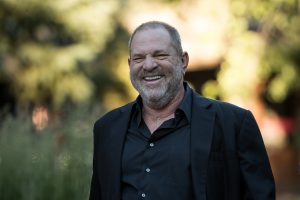(Image via Getty)
Ed. note: This is the latest installment in a series of posts on motherhood in the legal profession, in partnership with our friends at MothersEsquire. Welcome Robyn Smith to our pages.
Years ago, an older male attorney advised me — kindly, I suppose — to stop bringing cookies into the office or I would never be taken seriously as a civil litigator. It was the best advice he had for me, but we both knew there was no chance I would take it. At that point in my life, I had a little girl at home who baked with me every week on Wednesday night, and the cookies I brought were her leftovers. His point, though, was that the cookies drew attention to my gender, my family role, and my pronounced disadvantages that came from each. I was a mother. I would never be a great litigator.
But last year, pregnant with my second child, I tried three cases to jury verdicts over the course of my second and third trimesters. As a lawyer, I was okay in those trials. As a mother, though, I won about three million dollars in judgments for my clients.
I represent workers in cases involving discrimination, retaliation, wage abuse, and medical leave interference. In 2018, my pregnancy changed the way I try cases forever.
Before this pregnancy, my trial mode was pretty typical for a litigator. I ate very little, slept even less, and locked in on the facts of my case — to the exclusion of all of life’s other details. You can’t do that when you’re pregnant. So, for the three week-long trials in 2018, I ate plenty of food and slept at least seven hours a night. But more importantly, I cared for the people I represented as a mother would. With the support of my trial teams, I let that basic principal guide my heart and my head.
The first trial of my pregnancy took place at the beginning of my second trimester. I had made it past the fatigue and nausea of that first third of my pregnancy, and I was focused. My client was a disabled worker who had been berated and bullied by a boss, then fired for reporting the harassment. I had been called in to co-counsel the case when one of the previous attorneys had a personal emergency. I’d known the client for about a month when the trial began. Maybe it was the hormones, but by the first day of trial, I had become her surrogate mother.
Cross-examining her harasser, I was confronting my own child’s schoolyard bully. Cross-examining the owner of the company, I was indicting the school principal who had turned a blind eye to the bad behavior, but then punished my child when she protested her own mistreatment. More than once, at counsel table, I noticed my hand resting on my client’s forearm, reassuring her subconsciously. Every night, when I prayed for my baby’s health, I prayed that my client would also grow confident and strong.
Getting up to address the jury for closing arguments, I felt my eyes fill up with tears. Not now, damn it, I thought to myself. It seemed like those days, everything made me cry. The day before, it had been a quick glimpse at a stray dog on my drive home. This time, it was the adrenaline that comes from standing in front of a jury to ask a bunch of strangers to determine that your disabled client had been victimized.
I quelled the surge and opened my mouth to argue my client’s case. What came out was not quite the sermon I had practiced. What came out was my mother’s voice. For the next 40 minutes, I channeled my maternal outrage and love to ask a jury to vindicate my client. I urged the jury to correct a great wrong. I promised the jury that my client was determined to stand tall and move forward, no matter what. And for a moment, the jury and the courtroom fell away as I locked eyes with my client and told her, as I would tell my own daughter, that she was a star. It wasn’t until the jury’s unanimous verdict came back, awarding my client several hundred thousand dollars (a veritable fortune in a Kentucky courtroom) that I mused that my mom really had always known what she was talking about.
The last trial of my pregnancy took place in the sweltering summer, when I was eight months pregnant. I scurried around the courtroom on swollen ankles and flat shoes, and all I wanted to eat was fruit and anti-heartburn tablets.
My client was a black woman who had been fired after complaining of race discrimination in her city job. The city’s agents spent the week of trial describing her as “hostile,” “combative,” and “angry.” By the time I took the floor to close our case, I was determined to set the record straight. As I pointed out the subtle stains of racism in the city’s evidence, testimony, and argument, I felt my youngest child kicking along supportively. I thought instantly of my oldest child, and I considered the horror of ever seeing her dehumanized and demeaned. I implored the jury to see my client as a person, despite the city’s use of dog-whistle coding to portray her as a creature. Again, I felt the threat of tears. As I blinked them down, I looked at our jury and saw them nodding, glaring at the city’s representative, and writing down the numbers that they would later write on the verdict forms.
There’s no trick to it. You have to speak from your heart and occupy an authentic space as an advocate. In my case, that space is defined by my motherhood, because that informs every conviction, every desire, and every sense of purpose that I can truly express to 12 strangers. I’ll never be a legendary litigator, as those things go. I’m just a mother who doesn’t turn that part of myself off, ever. I could be any mother — and for all you know, I am the mother that you’re going to face next Monday at your hearing, or who is defending your next deposition, or who is reviewing your unreasonable written demand. You are free to pay attention only to the baby bump, or the sensible shoes, or the plate of cookies. I’ve never let them be disadvantages, and I have no plans to start now.
Earlier: Mothers At Law: Achieving Meaningful Success In The Legal Profession
 Robyn Smith is a partner at Bishop Friend Smith & Beilman in Louisville, Kentucky, where she and her partners are building a practice model centered around universal human dignity and empowerment. The daughter of a firefighter and a nurse, Robyn represents workers in their matters involving discrimination, harassment, retaliation, workplace endangerment, opportunity and pay deprivation, and whistleblowing. In 2018, Robyn tried three employment cases in Kentucky, all to plaintiffs’ verdicts. She also persuaded the Kentucky Supreme Court to deliver a unanimous opinion embracing the rights of workers to recover against employers who wrongfully interfere in their unemployment benefits applications. The Kentucky Trial Court Review named Robyn runner-up for Plaintiffs’ Trial Lawyer of the Year. Throughout these professional adventures in 2018, Robyn prepared for the arrival of her youngest child (who was not, after all, born in the courthouse). Some of Robyn’s favorite people started off as her clients, and she enjoys few things more than helping them celebrate their personal triumphs over adversity.
Robyn Smith is a partner at Bishop Friend Smith & Beilman in Louisville, Kentucky, where she and her partners are building a practice model centered around universal human dignity and empowerment. The daughter of a firefighter and a nurse, Robyn represents workers in their matters involving discrimination, harassment, retaliation, workplace endangerment, opportunity and pay deprivation, and whistleblowing. In 2018, Robyn tried three employment cases in Kentucky, all to plaintiffs’ verdicts. She also persuaded the Kentucky Supreme Court to deliver a unanimous opinion embracing the rights of workers to recover against employers who wrongfully interfere in their unemployment benefits applications. The Kentucky Trial Court Review named Robyn runner-up for Plaintiffs’ Trial Lawyer of the Year. Throughout these professional adventures in 2018, Robyn prepared for the arrival of her youngest child (who was not, after all, born in the courthouse). Some of Robyn’s favorite people started off as her clients, and she enjoys few things more than helping them celebrate their personal triumphs over adversity.















 Evan Gibbs is an attorney at
Evan Gibbs is an attorney at 



